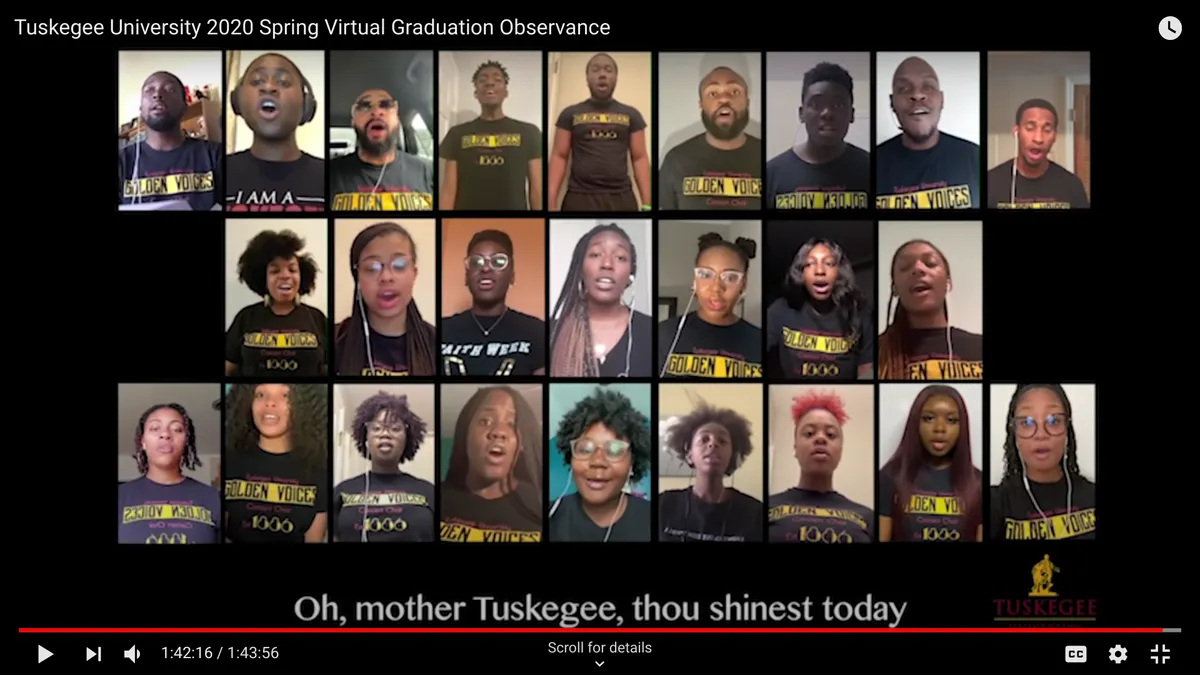Newly minted doctors taking oaths over Zoom. College presidents giving speeches from home. Students creating entire commencements inside computer games.
Graduation has taken on a new form during the COVID-19 pandemic. Gone, for now, are stadiums filled with cheers, instead replaced with teleconferences and smaller tributes to the class of 2020.
Some schools have managed to hold in-person ceremonies, with students spaced six feet apart or staying in their cars. Yet most colleges have had to decide whether to reschedule ceremonies, conduct them virtually, or do both.
"One of the greatest challenges is making this feel authentic, not sterile like we're going through the motions," said Michael Tullier, senior director of communications, public relations and marketing at Tuskegee University, a private historically black institution in Alabama. "It's as important for the morale of the employees ... and the alumni as it is for the students."
Colleges take graduation online
Typically, Tuskegee would host around 7,000 guests for its on-campus graduation, with as many as 550 students walking, Tullier said.
While officials hope they can host an in-person ceremony in December, they decided to honor students virtually in the meantime. A nearly two-hour pre-recorded event posted to YouTube earlier this month included choral performances and a speech by the university's president. Graduates were named individually, with a slide displaying their photo, name and hometown, as well as degrees and honors earned. The university made the slides available for download through Flickr.
In the 48 hours after its release, the video amassed more than 7,700 views and the university's YouTube channel saw a 62% increase in subscribers, Tullier said.
Similarly strong interest in Wayne State University's virtual graduation offerings surprised Carolyn Berry, its associate vice president of marketing.
The public institution, in Michigan, created a short video congratulating students that its schools and colleges could add onto with their own presentations. A 16-minute video of Wayne State's nursing convocation — which graduated about 130 students — got more than 1,000 views. All told, the videos have received more than 8,000 views, according to university data.
Like Tuskegee's, Wayne State's videos featured pre-recorded speeches from administrators. Some colleges read students' names aloud. Wayne State also included a tribute to three students who were awarded posthumous degrees, including sociology student Darrin Adams, who died of COVID-19 in April.
Tuskegee also participated in a virtual, nationwide event on May 16 honoring this year's HBCU graduates, which featured an address by former President Barack Obama. University President Lily McNair provided a pre-recorded video message for the event.
New ways to participate online
The online ceremonies are giving students, along with their families and friends, new ways to participate.
A webpage featuring Florida A&M University's virtual graduation includes the video ceremony, along with a dedicated hashtag. Students can also download a clip of their name being announced, or share it on social media. And viewers can post congratulatory messages using YouTube's live chat feature.
The university worked with United Kingdom-based StageClip to put the event together. The video got 19,500 views for some 2,000 graduates, StageClip CEO Rupert Forsythe said.
StageClip is one of several vendors that work with colleges to collect, package and share the materials needed to conduct a ceremony online. That includes gathering information such as name pronunciations, photos, videos and personal messages from students, and integrating them with university-generated presentations.
Virtual platforms aren't without challenges. Oklahoma City University ended its online graduation, held using teleconference platform Zoom, after an intruder displayed a racial slur and swastika.
And a cyberattack briefly delayed an online ceremony StageClip created for Florida Gulf Coast University. The attackers directed enough traffic to the school's graduation webpage to cause a massive slowdown, Forsythe said. The university paid StageClip about $14,000 for its services, the Fort Myers News-Press reported.
However, such attacks appear to be a rarity for online graduations so far.
Is it commencement if it's virtual?
The decision to take graduations virtual has met some resistance from students, however. Several petitions were published in protest after Oregon's Portland State University moved its in-person event online. University President Stephen Percy said the switch "was not an easy decision" in a statement emailed to Education Dive.
However, he added, "a virtual ceremony allows those students who won't be able to return at a later date to fully participate in our commencement celebration."
The university hasn't ruled out a future live event, though uncertainties surrounding the pandemic make it difficult to predict when that could happen. And it is encouraging students to submit ideas for the virtual one.
Portland State isn't the only school taking flak — the Massachusetts Institute of Technology, Northwestern University and the University of California, Los Angeles are among the schools to prompt petitions against online graduations.
Communication is key to winning student support for virtual ceremonies, college officials say. Administrators should explain why a change of plans is necessary and assure students that a virtual event isn't meant as an equal replacement for commencement, which is tied to established celebratory rituals that aren't easily replicated online.
Despite the success of their ceremonies, which were produced in-house, officials at Tuskegee and Wayne State don't see the change as permanent.
"As much as I loved how everything turned out, graduation will continue to be in person," Wayne State's Berry said.
Tullier, of Tuskegee, agrees. "All we're doing is a placeholder," he said.
















